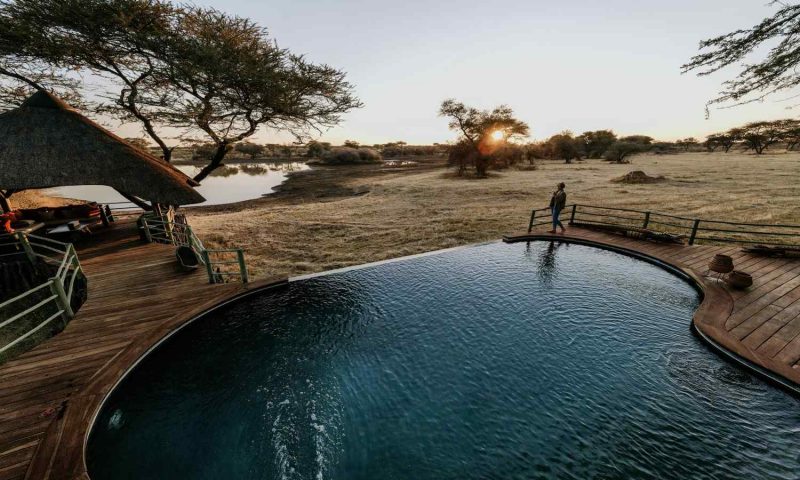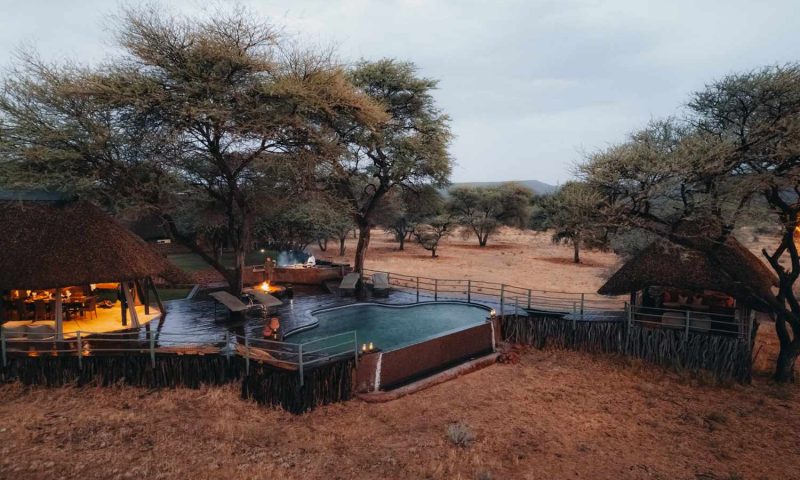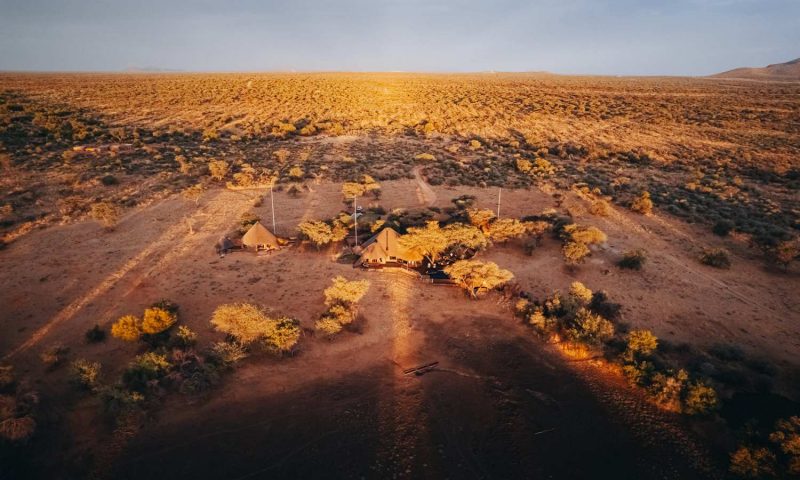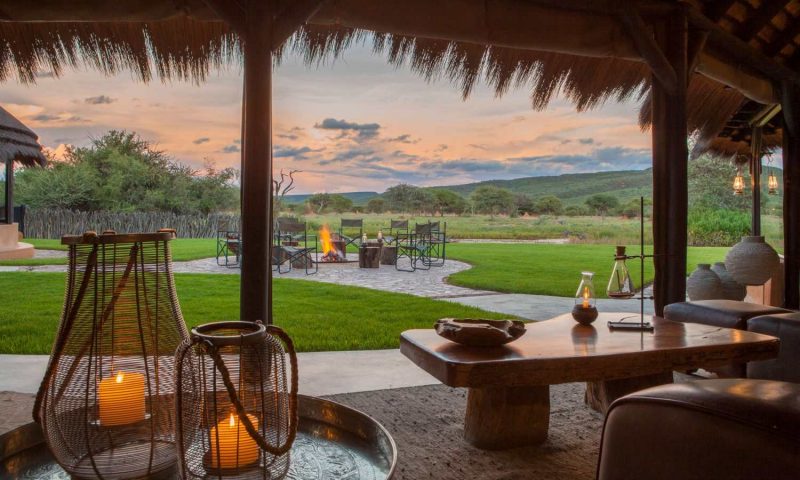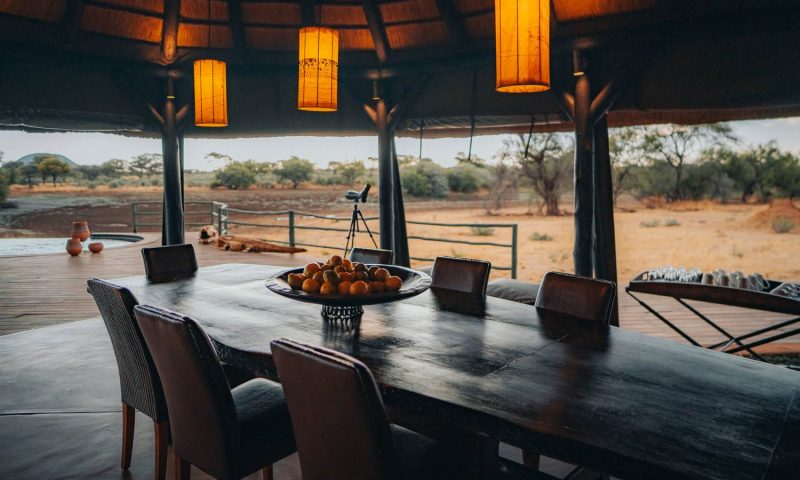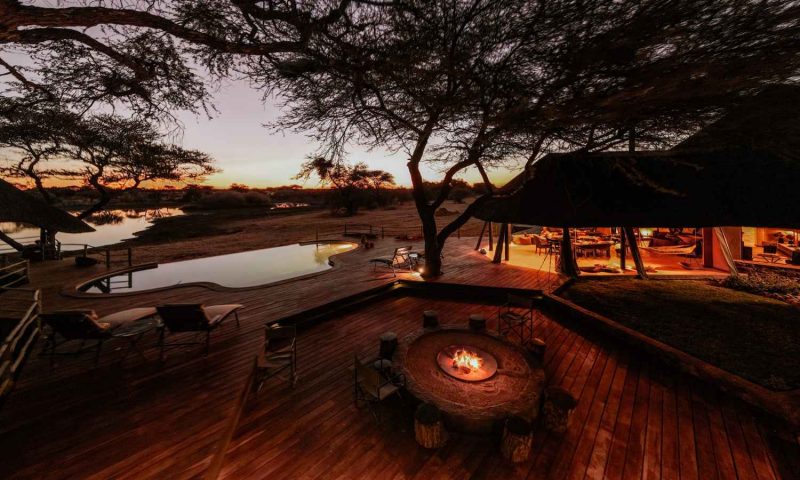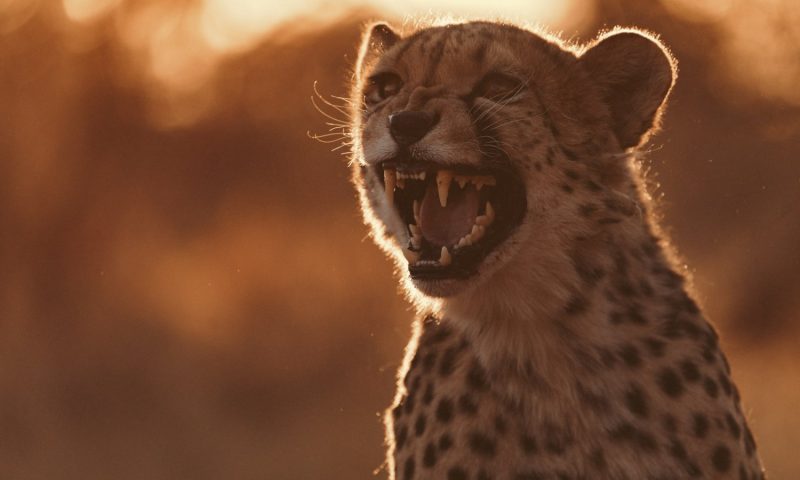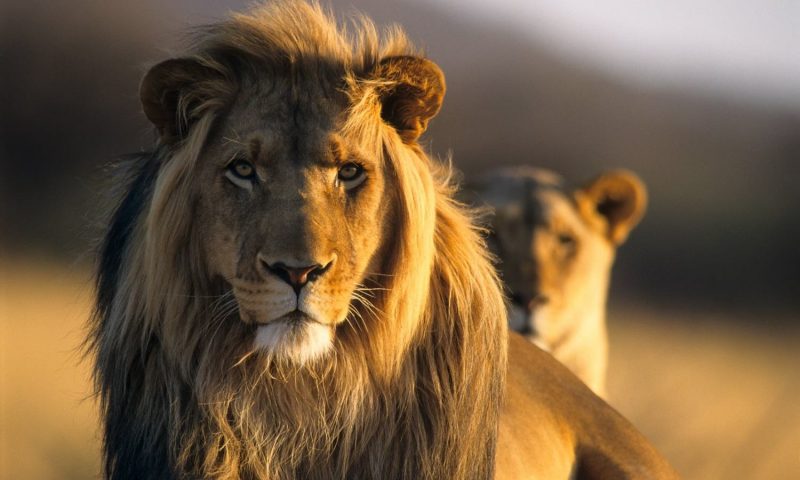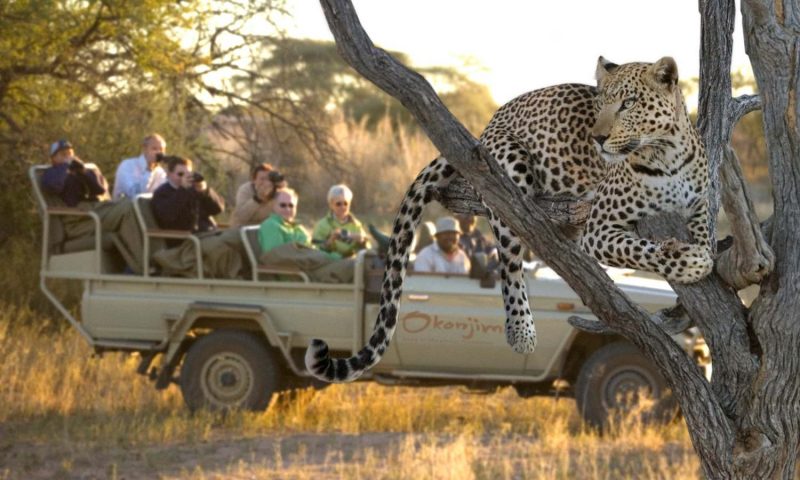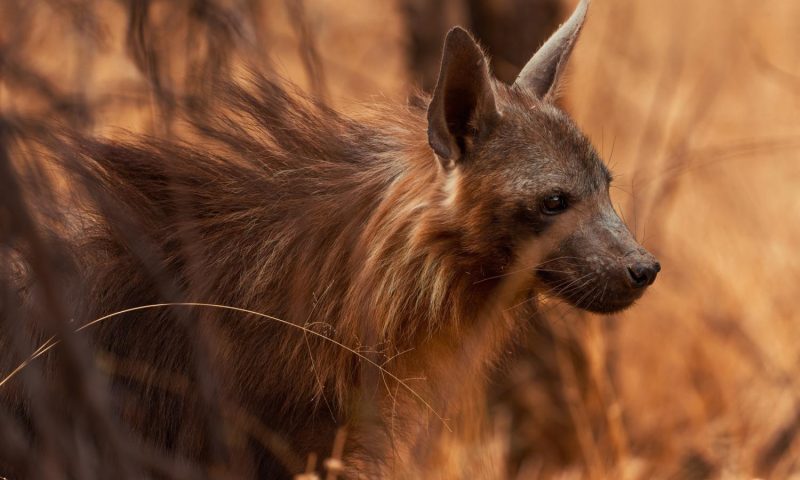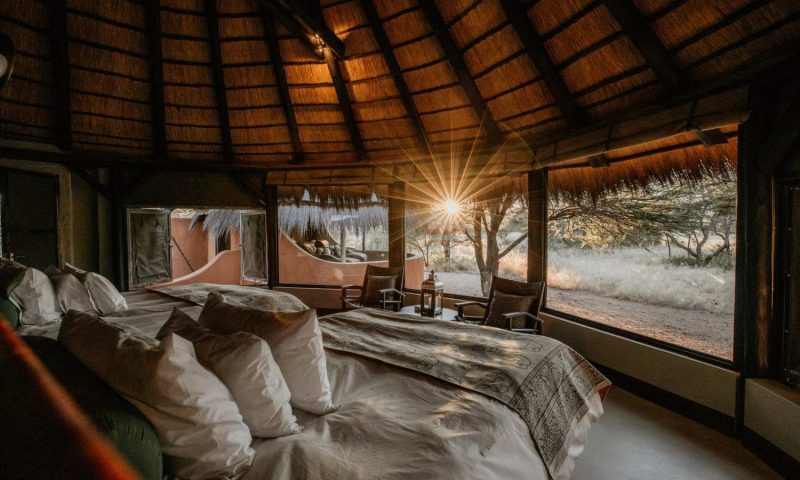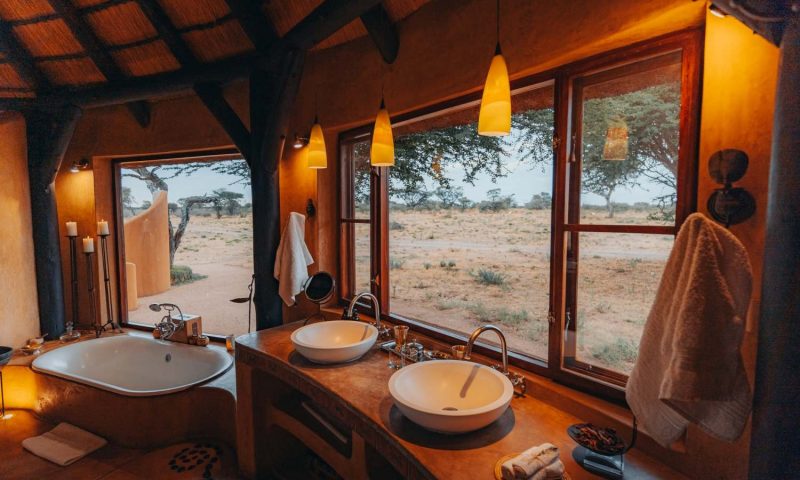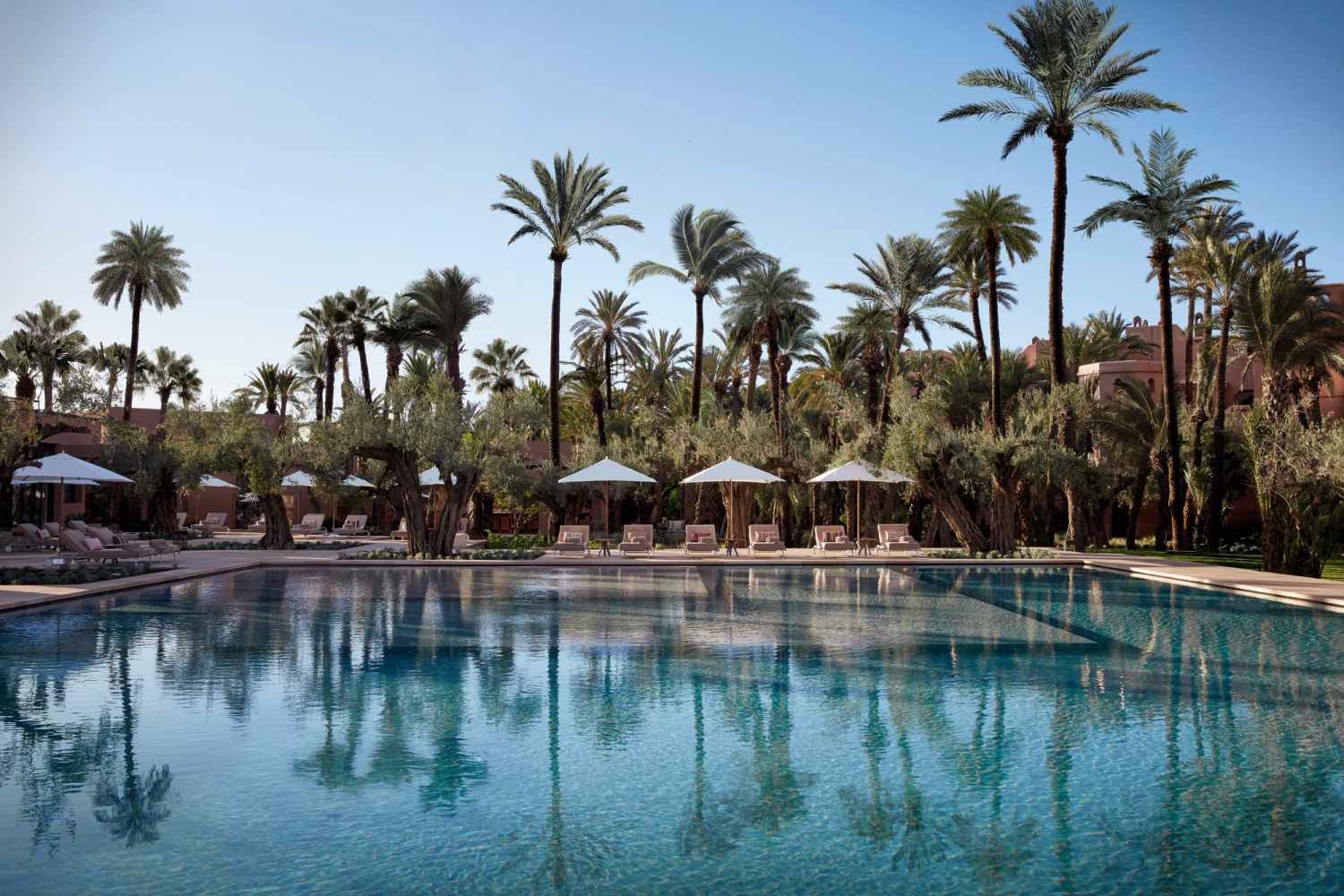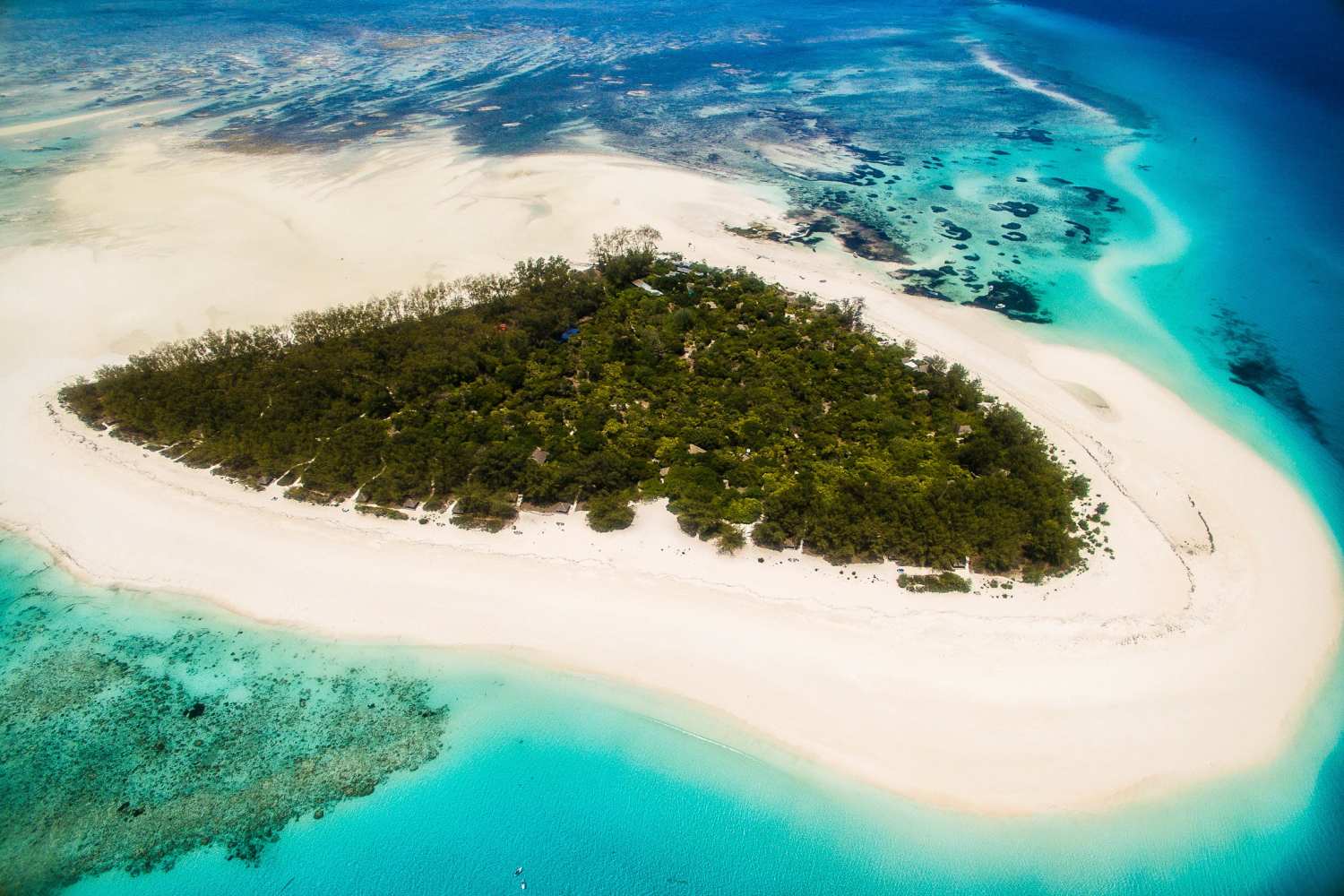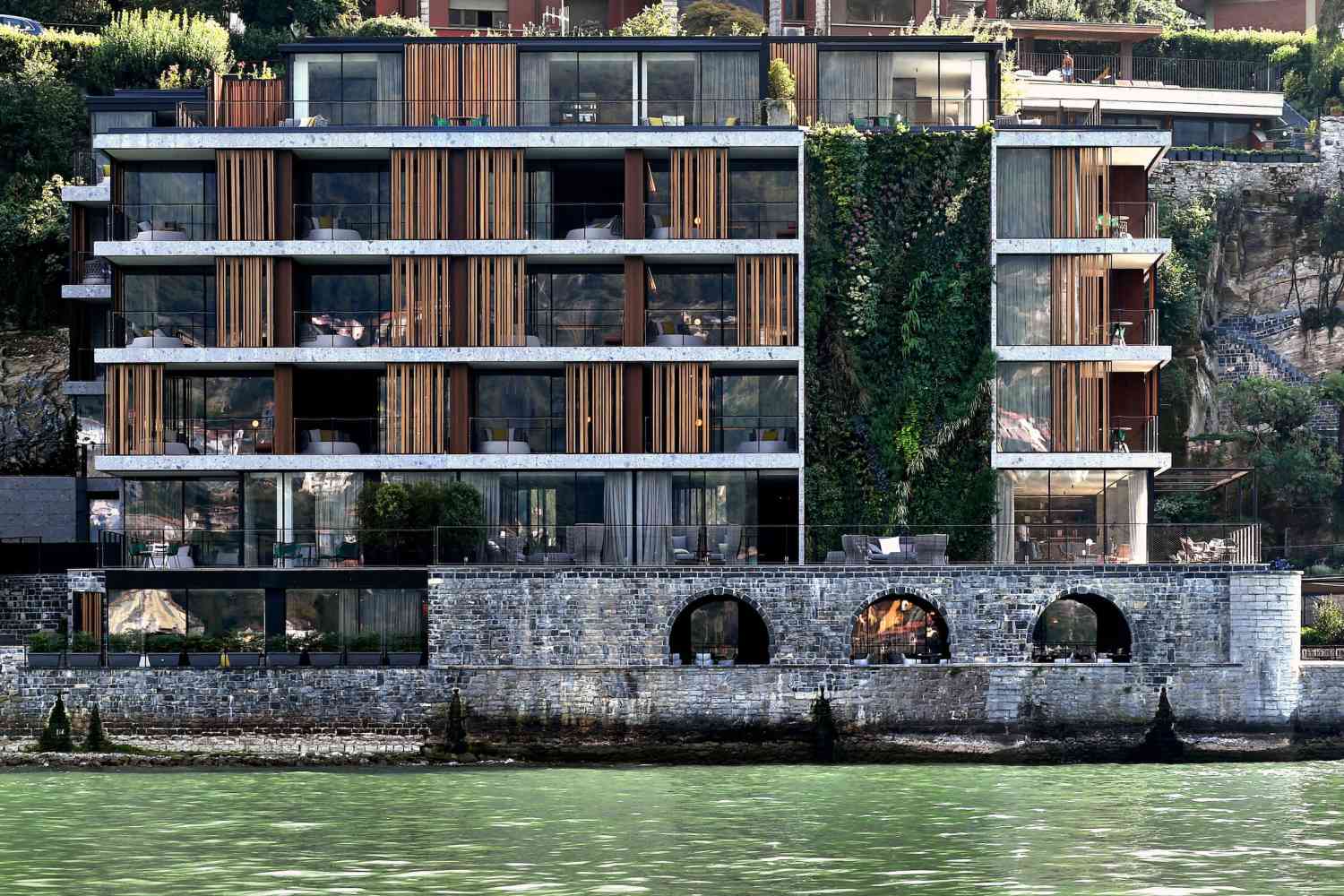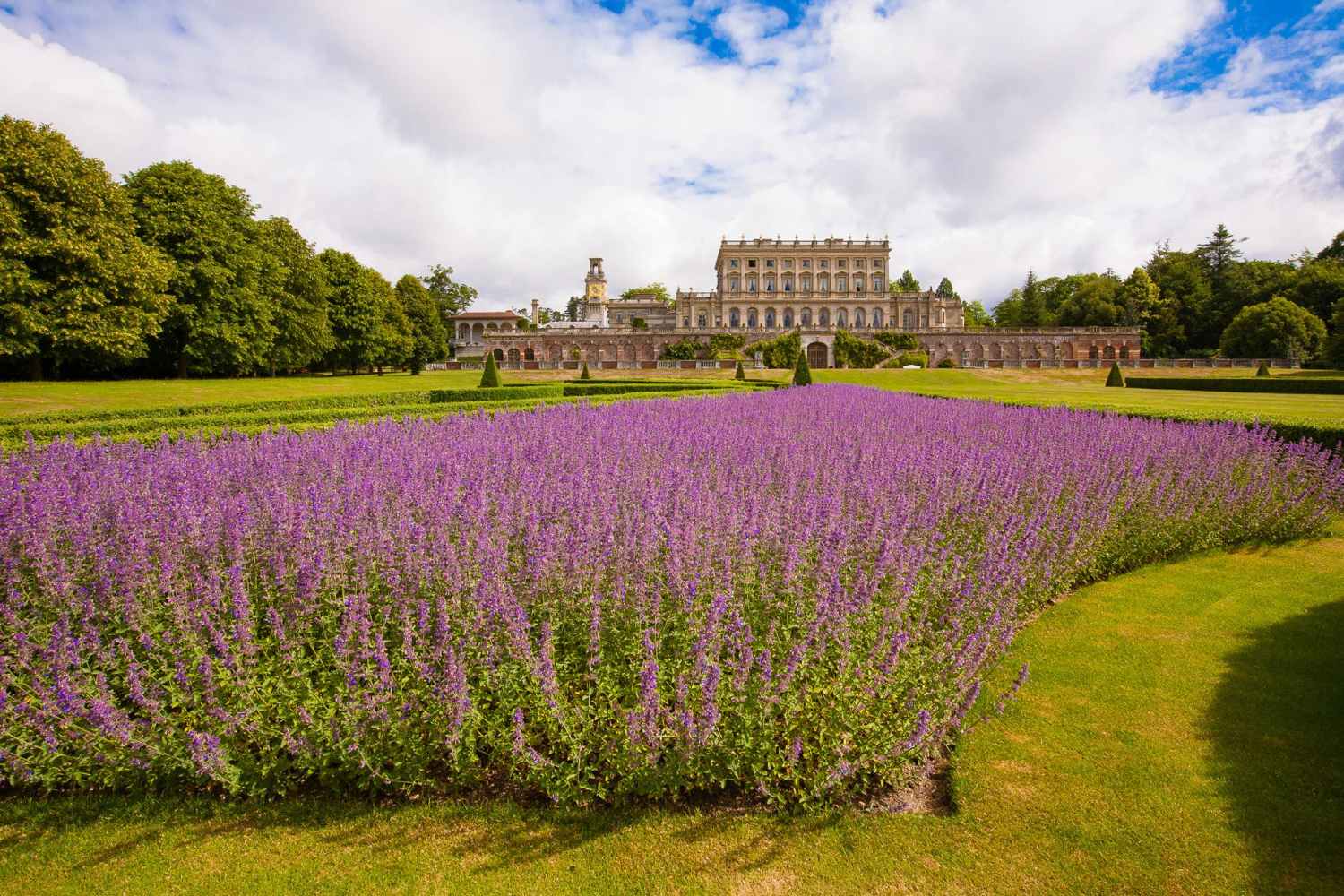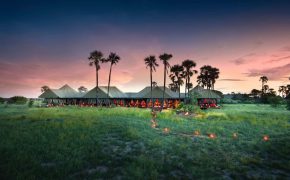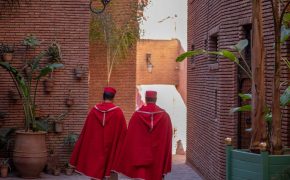The elegant Luxury Bush Camp is situated within the 2 000-ha enclosed wilderness area of Okonjima Nature Reserve, only 2.5 km from the Okonjima Plains Camp. Eight thatched, African-style chalets, a junior suite and three en-suite safari tents. The Luxury Bush Camp consists of:
- Eight thatched, safari-chic chalets with earthy tones and African design elements.
- Each of the private chalets are between 80-100 metres away from one other.
- The junior suite.
- A Camelthorn pod-shaped lapa that encompasses the reception area, curio shop, a cosy lounge area with inside and outside fireplaces, a restaurant and dining area. It looks out onto the waterhole.
- A secluded, private swimming pool.
- A Wi-Fi hotspot and has cellphone reception as well as undercover, private parking.
Each luxury chalet:
- Has large glass panels and canvas windows that can be completely opened for unrestricted views of the savannah that offers a truly magical African bush experience. Okonjima is a malaria-free area.
- Has an open-air sala with a semi-detached lounge area complete with a minibar, tea/coffee station and ample space to relax, and offers panoramic views of the natural surrounds.
- Is equipped with: two queen-size beds, a working desk with telephone and comfortable leather chairs.
- Has a Wi-Fi hotspot, cellphone reception as well as undercover, private parking.
- Has a birdbath that’s a highlight for any bird lover and a bird-feeding container should guests want to feed the birds.
The junior suite:
- Is a large 120m2 room with two queen-size beds and an en-suite lounge. The fireplace and bathtub will keep you warm during the winter nights, while the outdoor shower is ideal for the summer time.
- Combines relaxation and romance with its views overlooking Namibia’s spectacular landscape that epitomises a luxurious African safari experience.
- Has a Wi-Fi hotspot, cellphone reception as well as undercover, private parking.
- Is wheel-chair accessible.
Activities
The Okonjima Nature Reserve sprawls over 200 square kilometres of undulating plains, mountainous outcrops, and riverine thickets, and it is here that leopard (Panthera pardus), the most adaptable of all the wild cats, thrive. Read more about our Leopard Research.
These intelligent, solitary predators occur in high density in the expanse of Okonjima Nature Reserve’s multi-faceted topography. The Reserve’s predator research programme has spanned three decades, and its findings have provided great insight to leopard behavioral patterns as well as offered an upbeat prognosis for a sustainable future for the species in today’s Africa.
A two-day Okonjima stay offers the best chance to view wild leopard in Namibia, as well as those collared for research purposes, in their natural habitats.
Research programme leopard are actively tracked, and their collars are an invaluable resource for locating, and then returning to the Reserve, cats which have migrated to surrounding farmland where they are perceived as threats to livestock.
The Okonjima Nature Reserve, a huge protected area set amongst the rugged commercial farmlands of central Namibia, comprises a diversified ecosystem representative of both the larger and small mammals of Namibia, as well as most of the country’s endemic birds.
Game drives and guided bush walks offer visitors an intimate, up-close perspective of Namibia’s wildlife and, especially, its most protected species. The Okonjima Nature Reserve is home to and runs extensive research projects on rare and endangered species, big and small.
The Okonjima Experience
The Okonjima Nature Reserve sprawls over 200 square kilometres of undulating plains, mountainous outcrops, and riverine thickets, and it is here that leopard (Panthera pardus), the most adaptable of all the wild cats, thrive.
These intelligent, solitary predators occur in high density in the expanse of Okonjima Nature Reserve’s multi-faceted topography.
The Reserve’s predator research programme has spanned three decades, and its findings have provided great insight to leopard behavioral patterns as well as offered an upbeat prognosis for a sustainable future for the species in today’s Africa.
A two-day Okonjima stay offers the best chance to view wild leopard in Namibia, as well as those collared for research purposes, in their natural habitats.
Research programme leopard are actively tracked, and their collars are an invaluable resource for locating, and then returning to the Reserve, cats which have migrated to surrounding farmland where they are perceived as threats to livestock.
The Okonjima Nature Reserve, a huge protected area set amongst the rugged commercial farmlands of central Namibia, comprises a diversified ecosystem representative of both the larger and small mammals of Namibia, as well as most of the country’s endemic birds.
Game drives and guided bush walks offer visitors an intimate, up-close perspective of Namibia’s wildlife and, especially, its most protected species. The Okonjima Nature Reserve is home to, and runs extensive research projects on rare and endangered species, big and small.
Leopard Research
This research project is investigating the inter- and intraspecific relationship between different carnivore species in the 200 km2 Okonjima Nature Reserve, an enclosed conservation area. Study animals include leopard Panthera pardus, and brown hyena Parahyaena brunnea.
Interactions between predators, both within and between species are studied with the aid of VHF-telemetry, GPS-collars and camera traps.
The study will assess the extent of intraguild predation and determine the size of home ranges and territories for individual animals within the reserve and how they relate to those of other predators. In addition the study will provide valuable information on the success of carnivore rehabilitation in the reserve.
To effectively manage carnivores within a closed reserve, a thorough understanding of their altered ecology is needed to make informed management decisions.
Brown Hyaena Research
The Brown Hyaena population within the Okonjima Nature Reserve is one such group. It is a naturally occurring body, and since the 2010 erection of the predator-proof fencing around the reserve, little governance has been done to purposefully manage them.
Persecuted by farmers in the surrounding lands, as real or perceived threats to their livestock, they are fully in the middle of the Human-Wildlife Conflict zone! Hence the Okonjima Nature Reserve is essential for the protection and long term survival of wild populations.
The Brown Hyaena Research Project was launched in 2018 as a comprehensive scheme to observe the Brown Hyaenas, collect data, analyze the information, make recommendations and take action.
Pangolin Research
Okonjima Nature Reserve (ONR), home of the AfriCat Foundation, is also called home for a wide range of interesting species, one little known resident is a scaly anteater known as the Temminck’s ground pangolin (Smutsia temminckii) or ground pangolin.
They are one of eight pangolin species worldwide and one of four pangolin species which occur on the African continent, all of which are classified as Vulnerable by the International Union for Conservation of Nature (IUCN).
The other four species are found on the Asian continent, all of which are either classified as Endangered or Critically Endangered by the IUCN.
These animals are predominantly nocturnal which makes studying them difficult, especially in areas with high concentrations of predators, this is why African pangolin species are highly under researched.
Research & Collars
Okonjima established the AfriCat Foundation almost 30 years ago to advocate for the elimination of human-wildlife conflict, specifically in regard to Namibia’s predators.
In order to further understand the scope and efficacy of possible solutions to this conflict, AfriCat embarked on multi-faceted research which continues to this day. The volume of research output reaped from the Okonjima Nature Reserve over three decades has been vast, and yet so much knowledge is yet to be gleaned.
As such, various research projects remain underway within the Okonjima Nature Reserve. These academic undertakings cover, in the main, leopard, hyena, rhino, and pangolin. In the course of these behavioural, density, and movement studies, it is imperative to track a small number of subject animals.
This is done with the use of GPS or VHF tracking collars, which the Reserve’s rangers and researchers are able to locate, follow, and document.
Clear patterns emerging after years of study are providing new understanding of species behaviour, and this knowledge is now being shared with the University of Namibia’s veterinarian faculty’s students who undertake field and practical studies within the Reserve.
Okonjima and AfriCat have always worked in concert, and the two organisations have a highly symbiotic relationship. Okonjima has been the biggest supporter of AfriCat, and guests at Okonjima have been able to observe AfriCat’s work up close.
In giving guests a world-class game drive experience, Okonjima’s guides strive to show visitors the wide range of animals inhabiting the Reserve, but may also offer a closer look at one of the research animals.
Their collars are light and non-invasive (AfriCat shuns chipping and subcutaneous tracking devices), and the viewing experience is unparalleled in Namibia. Guides carefully explain the scope of the research programmes and relevant findings to guests.
Overall, a very small number of animals in the Reserve, less than 50, are collared for research purposes. Okonjima will shortly add more displays to the lodges detailing the scope and findings of the various research programmes over the past 30 years.
Okonjima will also augment viewing experiences with research summaries in each vehicle, so that sightings are juxtaposed with scientific data for those guests particularly interested in animal behaviour.
Despite challenges, AfriCat’s research efforts have continued unabated and, through continued support from Okonjima and its guests, will contribute much to cumulative knowledge of Namibia’s wildlife.
Carnivore Care Centre Experience
A highlight at Okonjima is learning about our big-cat passion. The Okonjima Nature Reserve is home to the headquarters of The AfriCat Foundation http://www.africat.org a non-profit organisation committed to long-term conservation of Namibia’s large carnivores.
AfriCat has evolved over the past three decades, and what started out primary as a welfare organisation has, over the years, identified the need to incorporate a focus on education and develop an ongoing collaboration with researchers, scientists, and conservation authorities.
This is undertaken through practical research of species-specific ecology and behaviour, as well as through the development of effective conservation and management strategies. AfriCat’s Carnivore Care Centre is a by-product of the Rescue and Release Programme which started in the early 1990s.
Some of AfriCat’s captive carnivores in our care today are too old or habituated to be reintroduced into the wild and will, therefore, remain under the expert care of the AfriCat Team. These animals have assumed the role of being Species Ambassadors for their wild counterparts.
Find out more about our ambassadors and how you can help by Sponsoring a Carnivore. After an informative afternoon trail, we end the day with a sundowner in an area of the Okonjima Nature Reserve which has a high density of the secretly-social and rarely-seen brown hyaena.
Carnivore Care Centre
Providing a ‘healthy living environment’ for large carnivores in temporary or permanent captivity is fundamental to minimising illness and injuries. The animals at AfriCat are housed in spacious enclosures of between twelve and fifty acres in a natural, stress-free environment.
They are fed a well-balanced diet and vitamin and mineral supplements are used to prevent deficiencies. The animals are observed on a daily basis to monitor their wellbeing and condition, allowing for a quick response and treatment for any illness or injuries should they occur.
Annual health checks on the carnivores at AfriCat are headed by veterinarians from Namibia and South Africa. In-depth health examinations are carried out on all the captive and rehabilitated carnivores.
All the cats are darted and then taken to a well-equipped clinic at AfriCat’s Carnivore Care Centre (ACCC) for evaluations. All the animals are vaccinated and treated for both external and internal parasites. Each cat receives a thorough dental examination.
All the carnivores are also weighed & measured – an ongoing research project to be able to accurately determine the body mass index of a captive and free-roaming carnivore. Read up on some of our Cheetah Research conducted over the years.
What is ‘Welfare’?
“The most widely accepted definition of ‘animal welfare’, is that it compromises the ‘state of the animal’s body and mind, and the extent which its nature is satisfied.” (i.e: genetic traits manifest in breed and temperament). The above would suggest that ‘animal welfare’ includes not only the state of the animal’s body, but also its feelings.
Most would agree that animals have feelings like fear, frustration, boredom, aggression etc and it has been proposed that ‘animal welfare’ consists entirely in feelings and that these have evolved to protect the animal’s primary needs.
Thus, if an animal feels well, it is faring well. A feelings-based approach to ‘welfare research’, typically measures behavioral outcomes and behavioral signs of fear or frustration. Such research has led to the conclusion that animals have fundamental behavioral needs that they must be allowed to satisfy!”
Nocturnal Drives
Guests are invited on a nocturnal game drive, led by our knowledgeable guides. This evening drive through the 20 000ha Okonjima Nature Reserve allows guests a chance to spot the many nocturnal game species they wouldn’t normally see during the day.
After the sun has set and the temperatures have dropped, the African bush comes to life once again: bat-eared foxes roam about, aardwolves are on the hunt for insects, owls observe their surroundings from a height, while leopards and brown hyaena go out in search of unsuspecting prey.
Luxury Bush Camp guests can visit their camp’s nocturnal hide, where they may see some after-dinner activity from porcupines, honey badgers and caracals, among other night-time animal species.
While the Okonjima African Villa and Private Bush Suite guests have the chance to see night life from their own flood-lit watering holes. All Okonjima guests are welcome to join a nocturnal safari game drive.
Birding on Okonjima
During an African safari in the Okonjima Nature Reserve you’ll partake in a number of thrilling activities – from game drives that focus on finding the elusive leopard, to hiking trails and tracking cheetahs on foot – each of which offer spectacular bird viewing opportunities.
Over 250 bird species have been spotted at Okonjima, making our reserve a bird lovers paradise. Alongside our predators and diverse wildlife, guests can expect to see up to 100 species during a short stay, and even more if the annual rains have recently fallen.
Spending hours out in the bush each day, our knowledgeable guides make birding on Okonjima an exciting activity as they share the passion for our Namibian birdlife.
The landscapes within the Okonjima Nature Reserve, with its elevated sandy plateau between the major escarpments of the Omboroko Mountains, boasts mixed woodland and acacia thornveld plains, making it the perfect birding destination.
Keep your binoculars at hand as you drive along the gravel roads to Okonjima, in the woodlands surrounding each lodge, and alongside the river beds where you’ll find larger trees.
Bird lovers are sure to tick off a few lifers, such as the Dwarf Bittern, Green Sandpiper, four Courser species, Hartlaub’s and Orange River Francolin, Ruppell’s Parrot, Violet Woodhoopoe, Damara Hornbill, Monteiro’s Hornbill, Bradfield’s Hornbill, Carp’s Tit, the Bare-cheeked Babbler, the Rockrunner, White-tailed Shrike, Crimson-breasted Shrike, and the Chestnut Weaver to name a few.
Bird encounters take place during our Okonjima Nature Reserve afternoon and morning drives. Bird watching also forms part of our self guided activity option whereby clients can take part in walking trails on their own and spend time in the bush in search of our indigenous wildlife.
The Day Centre
Visit The AfriCat Foundation for a day trip en route to or from Etosha National Park, just 10km off the B1 road. Day visitors can observe our foundation’s work and learn more about African predators, such as the lion, leopard and cheetah, and their plight for survival.
Refreshments and valuable conservation information await you at Okonjima Nature Reserve after a two-hour drive north of Windhoek or an hour’s drive south of Otjiwarongo. We appreciate your support as tourism funds the majority of AfriCat’s education, research and conservation work.
A highlight of any visit is learning about our big-cat passion. Okonjima Nature Reserve is home to The AfriCat Foundation, a non-profit organisation committed to long-term conservation of Namibia’s large carnivores.
We do NOT support interactions between humans and wild animals and none of our carnivore ambassadors are raised into that role.
Some of AfriCat’s captive carnivore ambassadors cannot be released back into the wild because they are: too tame; were a pet or hand-raised, which means they no longer fear humans; have injuries that will disadvantage them in the wild.
The carnivore ambassadors are used to educate our guests, nearby farmers, the youth and surrounding communities about the plight of predators. Through our education ambassadors we can explain human-wildlife conflict in a relaxed environment.
All captive animals are responsibly looked after. Their dietary and health requirements are maintained and their spacious enclosures – a minimum of 1 ha per large predator – need to be as true to their natural habitat as possible.
If you have the time: Hike up (or down) our mountain range, which has a bird’s eye view of the reserve, before taking a dip in our campsite swimming pool and keeping a look out for indigenous birdlife and small mammals.
If you overnight at Okonjima Nature Reserve: The 200km² private, nature reserve offers unforgettable African safari experiences with a high probability of tracking leopard and brown hyaena for guests staying at Okonjima Lodge It hosts four lodges, from rustic to exclusive, and a campsite.
The Nature Trails
Guests are invited to join a guided Off-The-Beaten-Track walk & drive activity. This undemanding combination of a short walking trail and nature drive in the Okonjima Nature Reserve is especially loved by our younger guests and families, due to interactive and informative demonstrations.
This two-hour experience provides a stimulating insight into the flora and fauna, as well as culture, of Namibia. Self-guided hiking along our nature trails:
Guests are encouraged to seek some self-reflection and solace in the Namibian wilderness, surrounded by Okonjima’s striking natural beauty and abundant wildlife.
Between early morning and afternoon game drives, guests may go on a self-guided hike along one of three well laid-out hiking trails. The trails vary between four and six kilometres and, clearly marked, they meander along spectacular landscapes where wildlife abounds.
The trails start a short distance from either of the Okonjima Lodge camps. Encounter all kinds of wildlife and birds whilst immersing yourself in the Okonjima wilderness.
Namibia Fitness Holiday
Spend a week or two surrounded by nature and wildlife in the heart of Namibia under the African sun, either on a personal or group package. Okonjima is about appreciating the power nature has to rejuvenate and realign your life in a healthy and active manner.
You will be introduced to an experience like no other led by it’s founder and former resident on Okonjima, fitness and Boxing coach Danny Groves accompanied by two leading UK fitness professionals Jon le Tocq and Matt Luxton.
A carefully executed program to ensure an overall wellbeing experience from nutrition, sports massages to strength training sessions at our very own outdoor gym, located on the banks of a riverbed.
You will have the chance to experience Namibia at her best on the saddle of a mountain bike and on foot up winding mountain trails in amongst wildlife. This healthy-living, fitness getaway in Namibia focusses on the mind, body and soul.
Supported by a healthy nutritional plan that includes your choice of lean, organic African game meats, healthy conventional foods or vegetarian options. It will restore your drive and ambition, while leaving you re-energised and with a sense of exhilaration.
